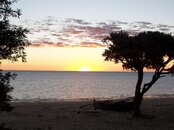nitrophila
Registered
Hi all,
Yikes, not sure whether to post this here or in the Marine science forum...
I'm hoping to hear from anyone who has taken a volunteering trip with any of the main organizations who do these things, like Blue Ventures, Coral Cay, Operation Wallacea & Reef Doctor. Were your experiences positive and would you recommend it?
I am in the *extremely* fortunate position of having a bit of time spare, and this looks like it might be a way of 'giving something back' at the same time as indulging my desire to dive my brain out! Really, really interested in hearing from anyone who's done something like this and hearing what they got out of it.
I have to be honest: what I'm a teensy bit worried about is it being a bit tame or phony. Like, I'm in my mid-30s and really keen on marine life and diving, and if I go somewhere that is really just aimed at students/gapyearers who are only just learning to dive with a few gentle nods to conservation then I think I'd feel disappointed. (NOT that I have any problem with young people, or reef monitoring - quite the opposite! - but I want something with subtance rather than something that turns out to be a thinly-veiled dive summer camp.)
Please post or PM if you have any comments or experience!
Suzie / nitrophila
Yikes, not sure whether to post this here or in the Marine science forum...
I'm hoping to hear from anyone who has taken a volunteering trip with any of the main organizations who do these things, like Blue Ventures, Coral Cay, Operation Wallacea & Reef Doctor. Were your experiences positive and would you recommend it?
I am in the *extremely* fortunate position of having a bit of time spare, and this looks like it might be a way of 'giving something back' at the same time as indulging my desire to dive my brain out! Really, really interested in hearing from anyone who's done something like this and hearing what they got out of it.
I have to be honest: what I'm a teensy bit worried about is it being a bit tame or phony. Like, I'm in my mid-30s and really keen on marine life and diving, and if I go somewhere that is really just aimed at students/gapyearers who are only just learning to dive with a few gentle nods to conservation then I think I'd feel disappointed. (NOT that I have any problem with young people, or reef monitoring - quite the opposite! - but I want something with subtance rather than something that turns out to be a thinly-veiled dive summer camp.)
Please post or PM if you have any comments or experience!
Suzie / nitrophila





